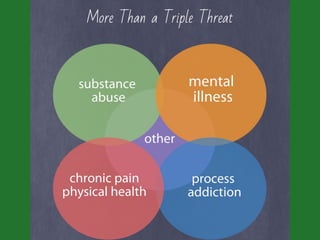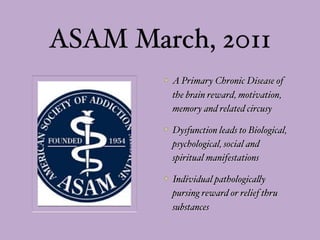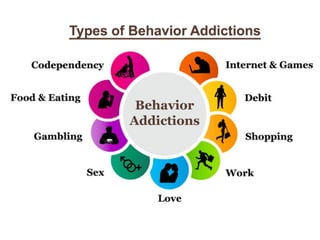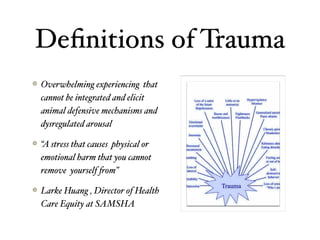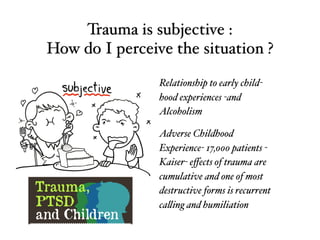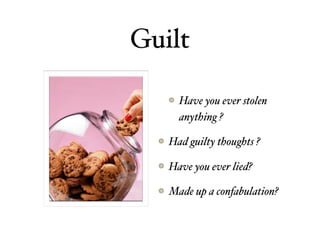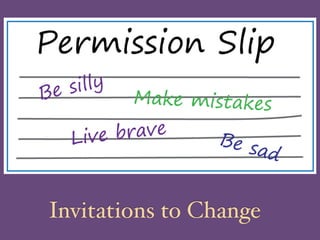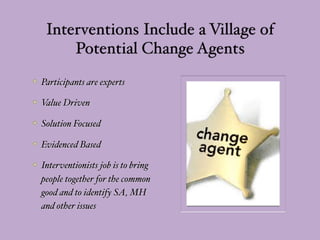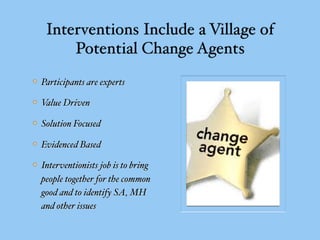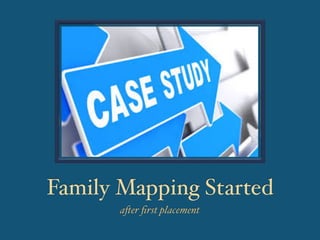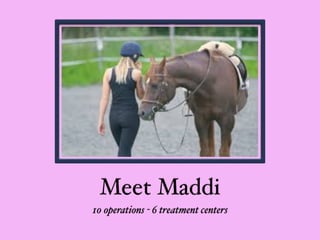Post Traumatic Growth Symposium
- 1. Post Traumatic Growth Symposuim 2018
- 3. Beyond Triple Threat- CIS LouiseA. Stanger Ed.D, LCSW, CDWF, CIP
- 4. About Dr. Louise Stanger • Clinician-Educator • Interventionist • Author-Falling Up A Memoir of Renewal- Amazon • The Clinicians Guide to Addiction Interventions-In press Routhledge • Widow, Wife, Mother, Grandmother • Soul Cycler adventurer
- 6. How Did You Arrive Today
- 9. Objectives Identify, Describe How Clients and Families Come to your Practice Identify , Describe and DiscussAddiction, Mental Heath , Chronic Pain and Process Disorders Identify how Trauma, Shame ,Guilt, Humiliation, Embarrassment , Grief and Loss Effect Ones Story about Themselves Identify how we as clinicians, behavioral health care professionals identify our clients
- 10. Objectives • Identify, Describe and Demonstrate CIS • Define & Describe & Identify how shame, trauma, addiction, mental & physical health effect families • Demonstrate the power of family mapping & science of portraiture in CIS • Share invitational vocabulary
- 11. Demonstrate CIS -Case Studies Clinical & Reverse Interventions
- 13. SubstanceAbuse- Mental Health-Depression/ Anxiety Chronic Pain-Physical Maladies Digital and other Process Disorders Relationship failures -Legal But-how do our clients arrive?
- 16. ASAM March, 2011 A Primary Chronic Disease of the brain reward, motivation, memory and related circusy Dysfunction leads to Biological, psychological, social and spiritual manifestations Individual pathologically pursing reward or relief thru substances
- 18. Chronic Pain 133 million People Experience Chronic Pain 1 in 5 globally 153 Billion was spent on adolescent chronic pain 65% of all people experience chronic pain once in their life 75 % of all heron users started with a prescription 155 people die daily
- 21. Trauma
- 22. Definitions of Trauma Overwhelming experiencing that cannot be integrated and elicit animal defensive mechanisms and dysregulated arousal “A stress that causes physical or emotional harm that you cannot remove yourself from” Larke Huang , Director of Health Care Equity at SAMSHA
- 23. Trauma is objective What happened ( My father killed himself, My baby dies of SIDS, I was date raped , humiliated etc
- 24. Trauma is subjective : How do I perceive the situation ? Relationship to early child- hood experiences -and Alcoholism Adverse Childhood Experience- 17,000 patients - Kaiser- effects of trauma are cumulative and one of most destructive forms is recurrent calling and humiliation
- 25. Trauma
- 26. What do your Clients Say about Trauma ???? Verbal abuse Physical abuse Witnessing a tragedy Not being told about something Accidents Divorce Death
- 28. Getting Emotionally Hooked When I Experience X I Feel- Body Sensation I Think -Whats my go-to thought process Behavior-What do I do?
- 29. Folks Are More Then Their Trauma Questions about life role Your place in life Coupled with a sense of loss Perhaps we have lost a core part of ourselves Sometimes we become still and quiet
- 31. Shame Shame is that intensely painful feeling of believing we are flawed and therefore unworthy of love and belonging. I am not good enough Brene Brown
- 33. Guilt Have you ever stolen anything ? Had guilty thoughts ? Have you ever lied? Made up a confabulation?
- 34. Humiliation The Act of Making Someone Inferior or Foolish
- 38. Loss and Grieving Loss -Something of Value is gone Grief = Total response to an emotional experience related to loss Breavement- Subjective response by loved one Mourning -behavioral response
- 39. Addiction -Attachment Disorder Values are lost as we attach to substances and other unhealthy behaviors
- 41. My Philosophy Of Treatment Sheldon Kopp. Existential Strength Based Gift of the Buddah
- 42. Sheldon Kopp The therapist can interpret, advise, provide the emotional acceptance and support that futures personal growth , and above all can listen…actively and purposefully, responding with the instrument of his trade, that is with his personal vulnerability of his own tumbling self. This listening is that which facilitates the patients telling of his tale that can set him free.”
- 44. Philosophy Strength based-it begins by looking for what is good and healthy and assumes the expression of goodness will always be laced with imperfections. Collaborative qualitative inquiry- The researcher becomes part of the conversation -Become witness to the conversation The Context -where the interview takes place becomes part of the portrait -Human experience is framed shaped by the setting. Discovering the tension between life, loss and liberation.
- 45. Brene Brown
- 46. Invitation is to Wholehearted living Strength based Cultivates Curiosity Owning Your Story ( Falling down and Rising UP) To look at our SFD and Confabulations
- 47. Family Mapping Is the Way In Story is our way home “We are the authors of our own lives We write our own daring endings We craft love from heartbreak Compassion from shame Grace from disappointment Courage from failure Showing Up is our Power
- 48. Take Aways
- 49. Strength based Collaborative Realistic Inclusive Looking for Goodness Listening to Strangers Client Centered Qualitative Inquiry- Open Ended Questions
- 51. To Articulate Your Philosophy
- 52. –LouiseA. Stanger An Intervention is an invitation to seek and accept care
- 53. Collective Intervention Strategies Louise Stanger Ed.D, LCSW, CDWF, CIP
- 54. Why CIS? • Collective - In that to be successful there must be a team of Families, Friend, Collegues, Associates, business partners , managers or co-workers assembled to bring about change • Intervention- In that we seek to move (i.e/ motivate a person to a place of change) • Strategy, in that nothing is set in stone ; we may adapt the process as needed
- 55. • Strength Based • Solution Focused • People are Teachable • Change is Possible • The Present is Important • We can rise to our best possible self Philosophical Underpinnings
- 56. Theoretical Underpinnings Salvador Minuchin Virginia Satir. TFT Bowen , Family Systems Bowlby,Attachment Monica McGoldrick- Family Systems Therapy
- 58. Theoretical Strategies • Motivational Interviewing • Cognitive Behavioral • Acceptance & Commitment • Values Clarification • Solution Focused • 12 Step or other Self help • Mindfulness • Breathing
- 59. Counseling Skills Used •Listening- Empathy •Genuine •Unconditional Positive Regard •Concreteness •Reflecting- Echoing Key words •Body Language •Open Ended Questions •Paraphrasing- Summarizing •Counselor Self Disclosure •To Do Not Harm
- 60. Collaborator “I am the mirror who reflects back their pain, their fears their voices. I am the inquirer who asks difficult questions, who searches for evidence and patterns. I am the companion on the journey bringing my own story to the encounter, making possible an interpretive collaboration, I am the audience who listens , laughs , weeps an applauds. I am the spider women spinning their tales.. I am the therapist who offers cathaersis support and challenge… I am also the stage manager coordinating the intersection of three plays- the story teller, the narrator and the readers inviting your voice to the drama” Sara Lawrence Lightfoot
- 61. Interventions Include a Village of Potential Change Agents Participants are experts Value Driven Solution Focused Evidenced Based Interventionists job is to bring people together for the common good and to identify SA, MH and other issues
- 62. Accountability Teams Sad-Disgusted Boundary less Loving -Worried Frustrated-Shocked Embarrassed- Shamed Terrified-Controlling At Wits End
- 63. Families are taught • The nature of substance abuse process and mental health disorders. If appropriate about chronic pain syndrome or other medical legal problems • The way an intervention is conducted • The active and instrumental part they have in moving someone to change
- 64. Dr. Louise Stanger “An Intervention requires Crucial Conversations”
- 65. War of The Roses Case Study
- 70. Interventions Include a Village of Potential Change Agents Participants are experts Value Driven Solution Focused Evidenced Based Interventionists job is to bring people together for the common good and to identify SA, MH and other issues
- 71. Clinician Interventionsist Must Be able to : • Develop a Team • Do a Family Map that engages everyone • Do a Retrospective -bio-psycho-social • Develop case strategy • Create Treatment Plan & Placement • Case Management • Follow with Aftercare • Facilitate Family Engagement in the healing process • Have Concierge Capabilities • ETHICS are Paramount
- 72. Beliefs an individual or group makes about what constitutes proper behavior Standard of Conduct Make sure you know
- 74. Basic Anatomy • Intervention Agreement & Initiative • Education, Information Gathering & Assessment • Implement , Review, Followup
- 75. Start where your Client is !
- 76. Family Mapping A Way into Story
- 77. Folks have unconsciously colluded with the problem
- 79. Dr. Louise Stanger “A Successful Intervention has the Potential To Transform not just the Identified Client but the Entire Family”
- 80. The Conversation will take you many places Open ended
- 81. Conversations will be non-linear
- 82. Always Start With Identified Love One
- 83. Qualitative Questions Tell Me about ……….. Tell me about your Family.. Tell me about your children, family, Grandparents etc
- 84. 20 The Wounded Hearts Secrets & Lies I LO Substance Abuse Legal Jack Learning disability SallySusie Laura John MikeJim Sr Mary Jack Susan Jena Jim Anxiety & depression Medical Bullying Work RAGE Religiosity Perfectionism - everythinglooks good Secrets T T T TT T T T T= Trauma = Money Issues Sample Family Map 18 = Affair Sally T died age 38 1614
- 86. Meet Sally Mental Health- Sucicidality- Disordered Eating -Substance Abuse
- 87. About Sally • Mother -Father South American, Jewish descent • Father Hx of Depression • Family has 4 children- Sally is the Subsequent child of an infant death - Brother died of brain tumor at 9 months, older brother age 5 dx with autism- PTS • Bullying, Isolation , No Friends • Trauma Riding , at School Sexual Assault • 4 Suicide Attempts-Disorded Eating- • Pills & Marijuana • No Formal Inpatient Treatment
- 88. Family Mapping Started after first placement
- 89. Meet Jack and his family 54 yo old retired executive lives with 29 yo son Two previous treatment episodes 3 children 19, 22, 29 Wife in process of divorce Being asked to leave treatment center as wrong placement Had to get him fromA -B
- 92. Families Readiness to Change In 2 months 3 out of 5 family members were ready to change In 7 months 3 out of 5 family members had engaged in treatment which lasted more then 60 days. 1 family member went for a 2 week intensive, 2 Private therapists 1 family member refused treatment
- 93. Meet Maddi 10 operations - 6 treatment centers
- 94. First major accident age 14 Family History of SA , MH and Molestation Pain Body, SexualAssault Trainer For past 9 years has been in and out of treatment centers Walking on crutches or not walking at all
- 95. Maddi gains trust with primary clinician Maddi gains trust with exercises Maddi Starts to talk to therapist Family is confronted with their substance abuse and their need to detach Maddi experiences a difference in family Maddi experiences a Community IntegrationApproach Maddi could be your next client
- 98. Meet Erik 20 years old Only son of high wealth family 92 sisters) Legal issues SubstanceAbuse Anxiety & Depression ADHD
- 100. Eriks Family Sisters-Bullying and Depression Mom -Family History of SA Mom in Recovery Dad Family History of SA and then Mom said I have something to share …………..
- 101. Erik’s mom My brother died at age 38 he had HIV
- 103. Be Curious
- 105. We can all Fall Up!
- 107. Contact Dr.Louise DrStanger@allaboutInterventions.co m www.allaboutinterventions.com 619-507-1699 Learn To Thrive Falling Up-Amazon The Definitive GuideAddiction Interventions-Collective Strategies- Stanger & Weber .In Press Routhledge
- 108. Resources Brown, Brene- Rising Strong . Speiegel & Grau International 2015 NYC NY Brown, Brene, DaringGreatly. Gothom Books 2012 Lawrence Lightfoot,Sarah & Hoffman Jessica .TheArt and Science of Portraiture. Joey Bass. 1997 LawrenceLightfoot, S. Respect , 1998. Press Books, Mass. Lawrence, Lightfoot,S. I’ve Known Rivers , Penguin Publishing. Ny 1995 Lawrence, Lightfoot, S Growing Each Other Up, University of Chicago Press. 2016
- 109. Resources Kopp, Sheldon- If You Meet The Buddah on the Road , Kill Him, 1982. Penguin House Random House, NY, NY Stanger, Louise. Falling Up-A Memoir of Renewal 2015, WZY Press Stanger,http://www.huffingtonpost.com/entry/tricksters-addiction- you_us_592f0f7ee4b0d80e3a8a329e Stanger http://www.huffingtonpost.com/entry/what-are-the- differences-between-trauma-addiction_us_58f4e7aee4b048372700da27 www.allaboutinterventions.com
- 110. Resources Stanger www.allaboutinterventions.com Systemic Model www.systemicintervention.com Arise www.linkingsystems.com Jays www.lovefirst.net Lamm www.bradlamm.com Seeley www.intervention911.com
- 111. Resources storti-www.stortimodel.com Mintz www.reallifeis Tap 35 www.motivational interviewing.org















